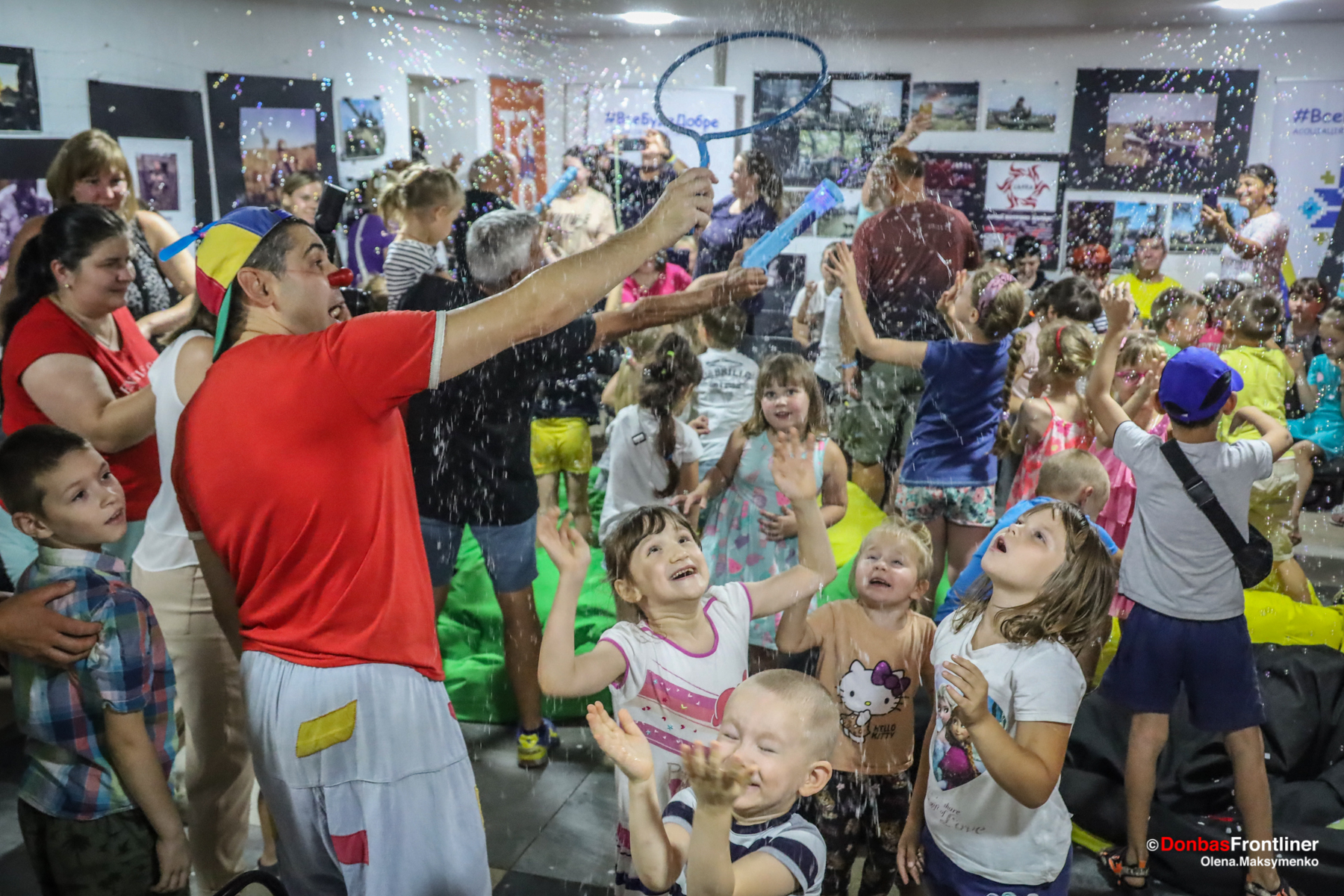
Article by Olena Maksymenko
Huge thanks for the translation, Orysia Hrudka/Euromaidan Press
Marco Rodari’s signature act is making giant bubbles. He creates enormous, magical orbs and launches them over his young audience. The children go wild, jumping up and down, squealing in delight as they try to pop the bubbles before they float away.
For over nine months, this Italian performer has brought joy and laughter to Ukrainian children. As Pimbo the clown, his red nose, magic tricks, and bubble shows give a break, though shortlived, to kids enduring the trauma of Russia’s full-scale invasion. Frontliner visited Rodari’s performance in Kramatorsk.
Rodari first arrived in Ukraine in March 2022, right after the full-scale war erupted. He started in Lviv, performing in shelters and volunteer centers. The artist has 30 years of experience entertaining children in war zones. Since 2009, he has done shows in Syria, Iraq, Gaza, and Palestine.
Rodari studied history and completed his education at theater school. His journey into charitable work started in hospitals when he was still a teenager himself.
Reflecting on those early days, he recalls, “When I was 14 years old in Italy, I realized that when I gathered 10 children and performed various magic tricks, the children would take notice of me. I then visited a hospital in Italy, followed by journeys to places where children were feeling unwell and sad. Remarkably, in my presence, although I don’t understand why, they would break into smiles.”
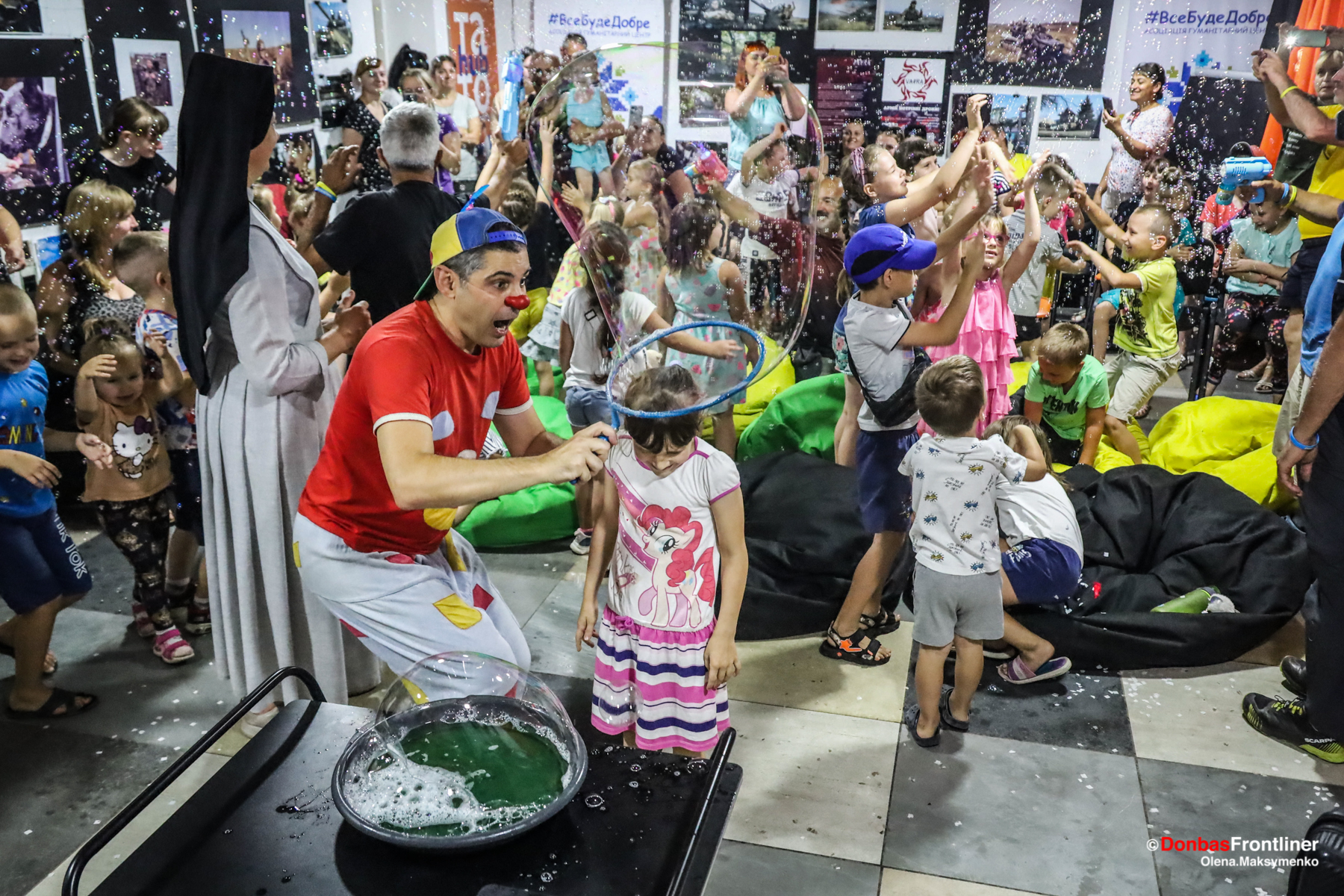
When shelling intensified in Ukraine’s east in the summer of 2022, Rodari returned to bring his show to the hardest-hit cities in Donetsk and Kharkiv oblasts. “I remember some very emotional days in Bakhmut for the children,” Rodari recalled, describing performing in basements during heavy fighting when shells exploded nearby.
Rodari says that while cultures may differ, children’s smiles are the same everywhere. “But here it is very different,” he said about Ukraine. “The culture is different. But the smiles of the children don’t change. They are the same – here and everywhere.”
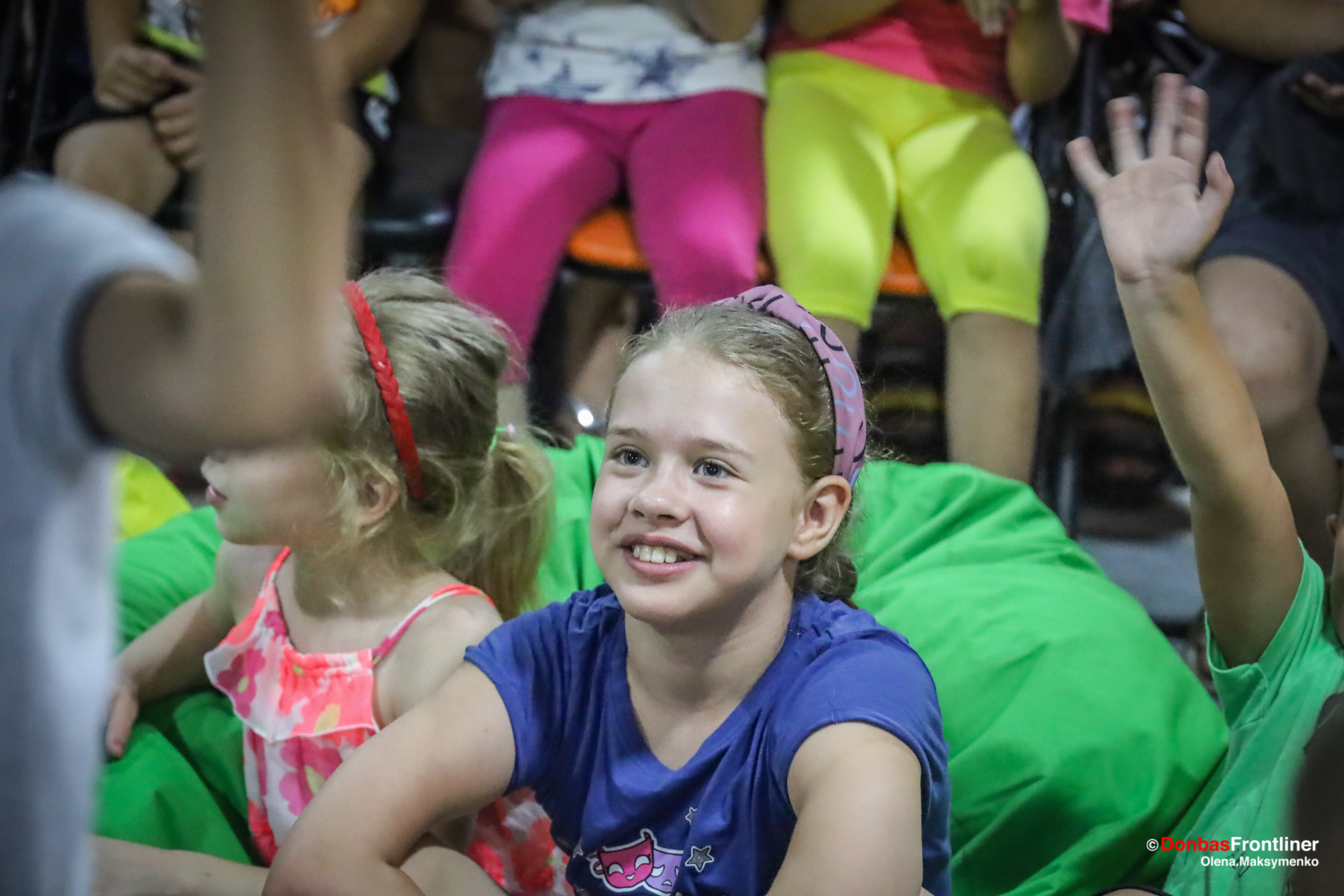
After Izium was liberated in September, Rodari helped to rebuild the children’s library in that city. “I was there with all the people, helping construct, rebuild the library for the kids,” he said. “And then, just days ago, I went to another place where I can do three to four shows per day if it’s possible.”
Dad Hub: from fishing club to evacuation and psychological help
Rodari partners with the Catholic church and local Ukrainian organizations that connect him with audiences in need. In Kramatorsk, he worked with a local community center called Tato Hub (Dad Hub) that provides art therapy, psychological support, and evacuation assistance to children.
The head of the center, Oleksandr Ivanov, explained that initially, the center was called Fishing Club of Ukraine and focused on promoting responsible parenthood through activities like tourism, fishing, rafting, competitions, and community clean-up efforts. However, as the full-scale war began, Tato Hub became involved in more pressing matters, notably evacuation.
They also offer initial psychological support to children, primarily through group psychological consultations and art therapy sessions led by a professional psychologist. The psychologist helps children address anxieties, cope with fears, and learn how to handle crisis situations. Simultaneously, they work with parents, teaching them how to provide independent support to their children at home.

“For parents who bring their children here for the first time, there are tears in their eyes because they’re used to living independently and solving their problems on their own,” Ivanov said.
“But here, the child interacts with others – well, on some level – but they play, laugh, and it’s interesting and fun. And the mother gets a break. It’s pleasant that we can help, but it’s unpleasant that people are here, in Kramatorsk. It’s not a safe place, but we understand that everyone has their own situation. We try to have constant discussions about evacuation, and again, we assist if there is a desire and opportunity. If not, let’s think about how to make it work.”
Many kids who attend Tato Hub are refugees from frontline towns like Siversk and Chasiv Yar who are dealing with the trauma of living in basements for months under intense shelling and missiles. Volunteers at the center share heartbreaking stories of parents who refused to evacuate and later died in attacks.

“There were many cases where families registered to leave. They would come, saying, ‘Well, we’ll think about it for a day or two.’ And a day later, we’d take the husband away, and there wasn’t even an opportunity to bury the wife. Unfortunately, such cases did occur, and these cases are a blow to the volunteers. Because we came, we talked to them but couldn’t persuade them. This happened a lot when the advance was towards Bakhmut,” Ivanov says.
Ivanov has a team of volunteers who do dangerous work evacuating people from frontline towns. “A lot of our volunteers died,” Ivanov said.
Rodari has witnessed the war himself, accompanying these volunteers. “He saw with his own eyes when an S-300 rocket flew into a neighboring building,” the Hub’s workers said about one trip to Chasiv Yar. “He doesn’t need anyone to explain that there is a war here. He saw it with his own eyes.”
Rodari acknowledges he feels fear of being in Ukraine but is committed to continuing his shows. “They all have fear,” Rodari says about local parents and their children. “Because this is war. I hope that it will end.”
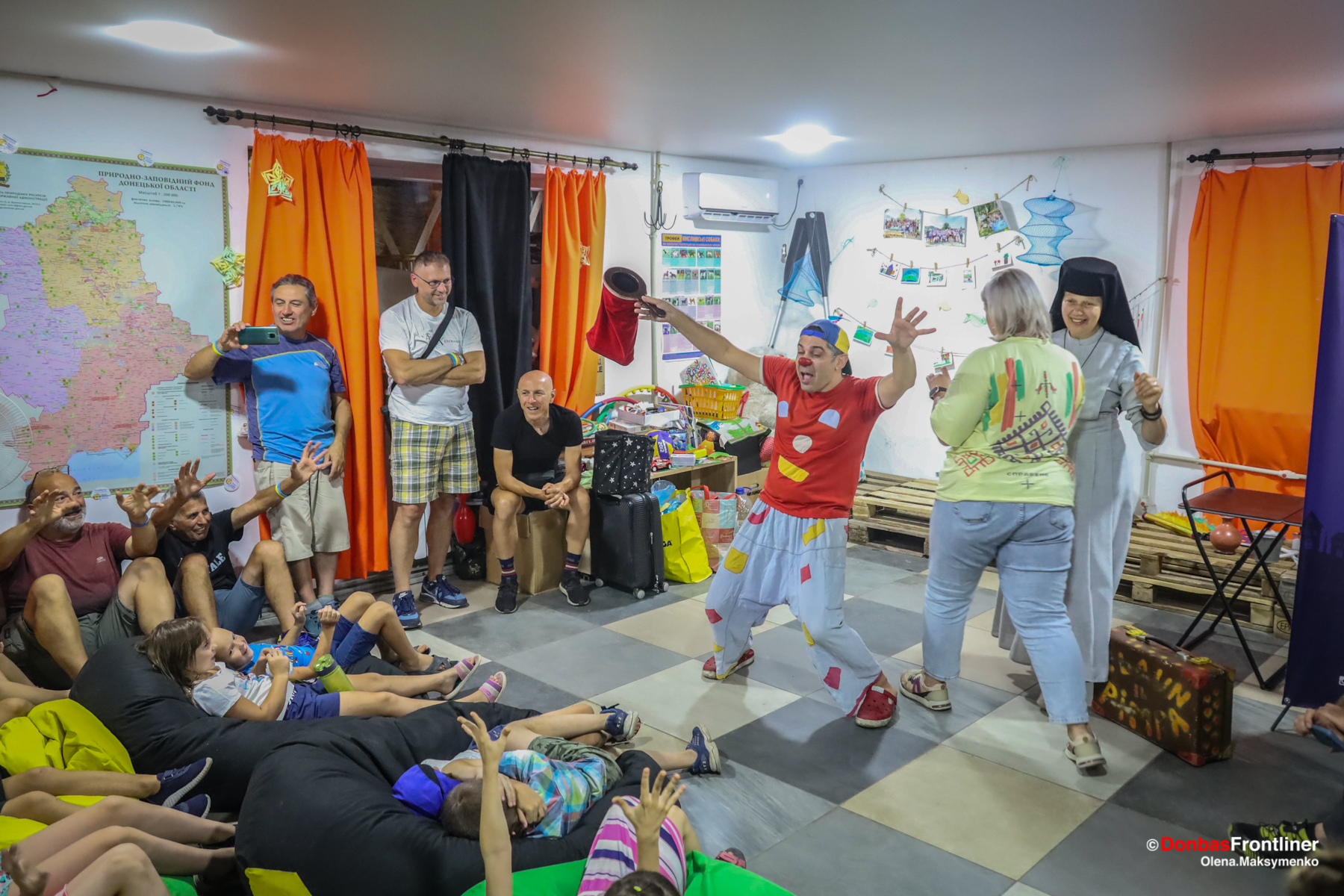
Rodari says seeing children smile in Kramatorsk and other parts of Donbas is “really impressive” and gives them a sense of normal life amid the chaos of war.
“When I see in this city the smiles of the children, it’s really amazing, amazing,” Rodari said about performing in Kramatorsk.
Inside Marco Rodari’s enchanting performance
Journalist Olena Maksymenko witnessed one of Rodari’s performances:
He begins with the simplest tricks involving the retrieval of objects from seemingly empty containers. Initially, a nun assists him, but then he starts involving children. “Is it there?.. Nope! …” he says, humorously pronouncing the Ukrainian words. “No, nooooo! …” shout the children.
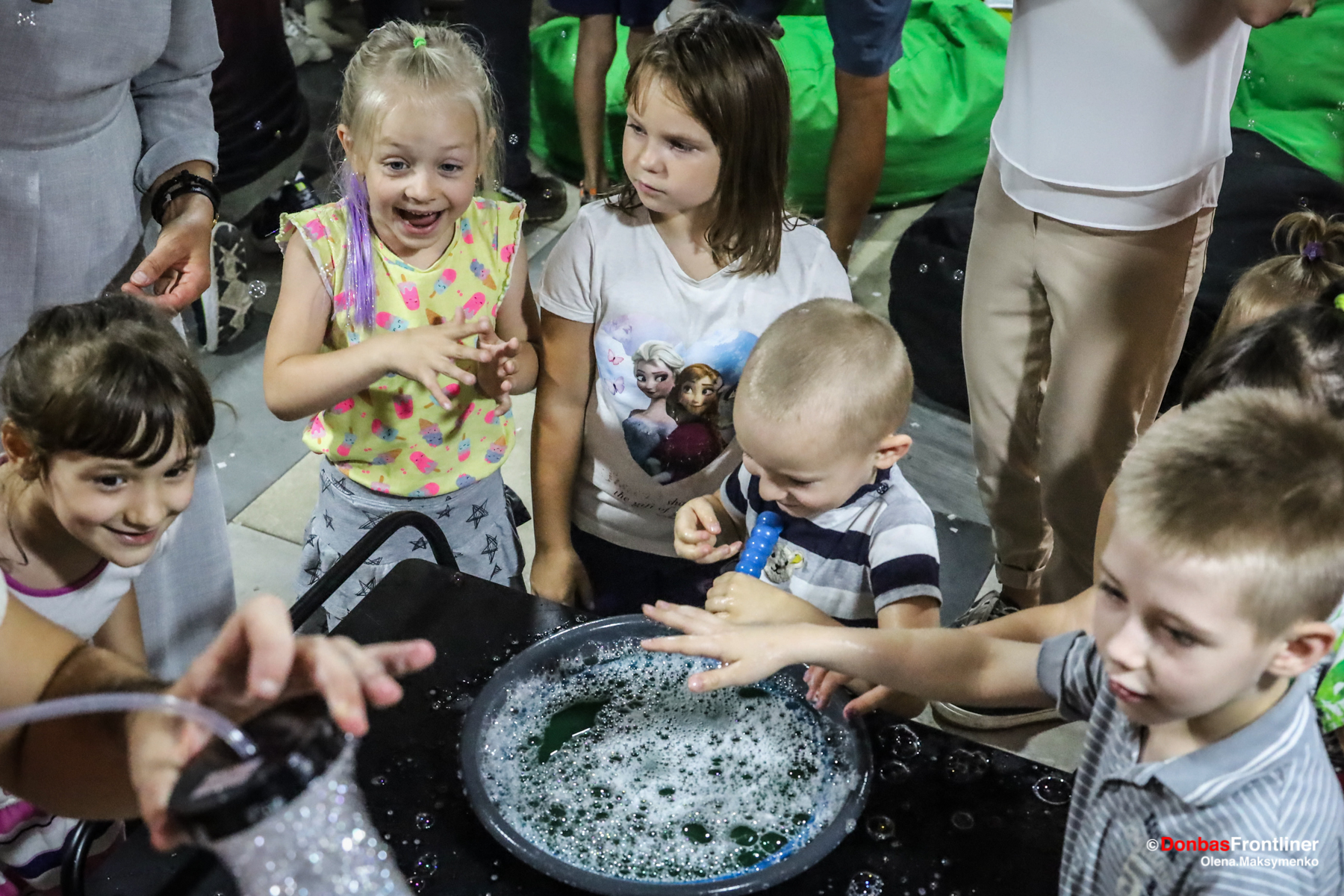
Out of nowhere, he produces bottles of cola and boxes of chips. The tricks become increasingly complex. For instance, he has an album with blank pages, but when he runs his finger along the cover, images appear on the pages – first, scribbles, and then fully recognizable drawings. Then, there’s a liquid poured into a pitcher, and white feathers, resembling snow, pour out of the pitcher, which Rodari sprinkles on his assistant. As the show goes on, more and more children get excited, and it becomes harder to hold them back – they all want to be on stage and participate in the show. One of the spectators is a girl in a wheelchair with signs of cerebral palsy, accompanied by her sister. The girl in the wheelchair is smiling, her eyes sparkling. Her sister enthusiastically explains something to her using sign language.
Rodari’s signature act involves giant soap bubbles. He creates enormous bubbles and launches them over the audience. The children go wild and jump around trying to pop them. “Wait, please, sit down for just a minute!” the artist pleads through his assistants.
“I want to try making one really big bubble!” The plea works for only a few seconds. After that, Rodari makes bubbles in a way that a child ends up inside one of them. He invites everyone willing to make a big bubble – the audience surrounds a basin of soapy solution like a flock of sparrows. Meanwhile, his assistants “shoot” into the air with a gun that generates hundreds of small bubbles. Laughter fills the space. As a farewell, they all take a group photo.

Rodari concludes one of his performances with “A very good day, especially for children! … For children, for mothers, for all people, because this … this is a normal day in Kramatorsk! And it’s so important. When I see the smiles of children in this city, it’s truly impressive! It’s impressive! In this city and other parts of Donbas.”